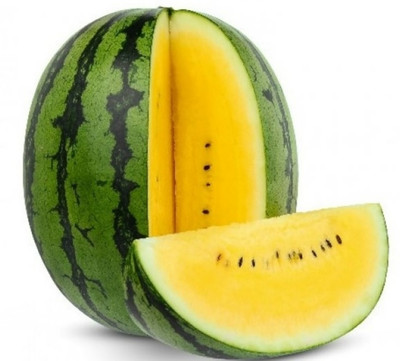MORENK Yellow Watermelon seeds for Super Sweet Big Seed(50 per packet)
Quick Overview
Product Price Comparison
Specifications of Watermelon SeedsCommon NameWatermelonSunlight6 to 8 hours a day(or more) Water1 to 2 inches of water per week. Keep soil moist, but not waterloggedTemperature65┬░Fand95┬░F.SoilpH levels of 5.18-5.60FertilizerPotassium and Phosphorus based fertilizersGermination3-10 daysHarvest Season65 to 90 daysPlanting and Care for WatermelonSowing Watermelon SeedsWatermelon seeds are one of the simplest seeds to harvest from ripe fruit and save.Watermelon plants are extremely frost-sensitive, and prolonged exposure to cold weather can cause them to die.Plant watermelon seeds in grow bags in your terrace garden to jumpstart the growing season.Seeds should be sown 12 inches (13 mm) long.At a colder temperature, seeds will germinate in 3 to 10 days.After the soil has warmed to at least 21┬░C, transplant seedlings into the greenhouse.Plant in a prominent location and space mounds ten feet apart; vines can easily grow ten to fifteen feet.Keep the soil moist to prevent it from drying out.Watermelons prefer a pH range of 7.0 to 8.0 in their soil.Watermelons should be grown in full sun for the highest yield.Growing watermelonTry to add fertility to the soil before sowing watermelon seeds, so it makes the process quicker and more likely for the seedlings to get started.The higher the soil temperature, the more quickly watermelon seeds germinate.Use black plastic mulch to support the watermelon's germination.Seeds planted too deeply will not establish properly. Bury watermelon seeds between 1/2 and 1 inch deep for optimum germination.Male and female flowers grow on the same vine in watermelons.The smaller male flowers bloom first. The little melons have already formed in the flower buds of the females.If you do not see female flowers, there are some possible explanations: it is too hot or too cold, there is insufficient water or nutrients... In either case, this indicates that the watermelon plant is unhappy.If the plant produces female flowers but the small fruit at its base shrivels and dies, the flowers may remain unpollinated.Watermelon flowers are pollinated by insects. If you have reason to believe the insects are not doing their job, you should conduct your inspection to be certain.Hand pollination is most effective in the early morning. Remove some male flowers and their petals. Then brush the pollen-laden stamen against the stigma in the female flower's middle, allowing the pollen to adhere. Simple.On each branch, the first few female flowers will produce the best fruit.To maximize their size, pinch out the tip of the branch after many fruits have set.Harvesting watermelonThe surest indicator of maturity is the color on the bottom of the melon on the ground of most watermelon varieties.You need to develop and mature a watermelon for at least three months in warm sunny weather.As the melon ages, it changes from nearly colorless to deep yellow.They lose their powdery or shiny appearance when completely ripe.It takes skill to tell when a watermelon is ripe. With practice, you'll get to work at it.The curly tendril at the stem is the first sign to watch for. Your watermelon will be ready until it is completely dry, not just beginning to dry off.Another warning is a light-colored patch on the fruit's rim. It is initially greenish, but as it ripens, the green tinge fades and it becomes yellowish. Overall, the skin becomes duller and harder.The most common way to tell whether watermelons are ripe, however, is by sound. Knock them with your knuckles to hear if they make a dull, hollow sound. The tone of unripe melons is higher pitched. Continue thumping and contrasting before you can say the difference.Precautions while growing watermelonEnsure that your watermelons receive an adequate amount of water. Consistently water the soil so avoid making the plant's leaves wet.Additionally, you should apply mulch to prevent the soil from drying out.Watermelons need to mature for a long time, and they are advised to periodically feed them with a high-quality fertilizer.Place the fruit on a sheet of cardboard or a bed of straw when it is about the size of a softball to avoid rot.Water just enough to keep the plant from wilting for about a week until the melons are ready. This aids in the concentration of sugars in the fruit, resulting in a tastier watermelon.


